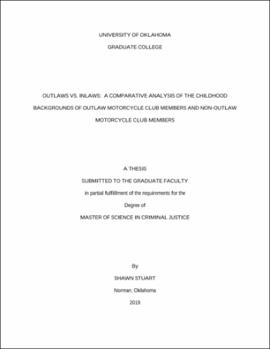| dc.contributor.advisor | Duncan, John | |
| dc.contributor.author | Stuart, Shawn | |
| dc.date.accessioned | 2019-04-12T15:32:01Z | |
| dc.date.available | 2019-04-12T15:32:01Z | |
| dc.date.issued | 2019-05-10 | |
| dc.identifier.uri | https://hdl.handle.net/11244/318004 | |
| dc.description.abstract | Why do individuals join Outlaw Motorcycle Clubs? The present research study explores the childhood backgrounds of Outlaw Motorcycle Club members compared to the childhood backgrounds of Non-Outlaw Motorcycle Club members. Three questions direct the research study: (a) do Outlaw Motorcycle Club members experience more risk factors during childhood than Non-Outlaw Motorcycle Club members, (b) can risk factors motivate one to join a stigmatized group such as an Outlaw Motorcycle Club, and (c) how is belonging restored in the Outlaw Motorcycle Club? Street gang research provides a model for analysis of how risk factors predict joining an Outlaw Motorcycle Club. Utilizing a descriptive, exploratory, and quantitative design, data collection involved outlaw and non-outlaw participants throughout Canada and the United States. An evolutionary psychological perspective combined with the Belongingness Hypothesis frames the interpretation and analysis of what differentiates outlaw from non-outlaw motorcyclists. The outlaw literature can be interpreted as incomplete because of its outdatedness and limited information on outlaw’s childhood backgrounds. Further, newer research identified more similarities between outlaws and non-outlaws. Thus, it leaves us without an understanding of what differentiates them. Knowing the differences is important as law enforcement considers Outlaw Motorcycle Clubs highly organized criminal groups. While many might believe the difference between outlaws and non-outlaws is deviance, this research study suggests exclusion during childhood leads to an impeded self-control and a heightened need to belong causing one to reject society and join a stigmatized group such as an Outlaw Motorcycle Club. In the Outlaw Motorcycle Club one can regain their self-control and restore belonging. Recommendations for future research include comparing participant’s past and present sense of belonging. | en_US |
| dc.language | en | en_US |
| dc.rights | Attribution-NonCommercial-NoDerivatives 4.0 International | * |
| dc.rights.uri | https://creativecommons.org/licenses/by-nc-nd/4.0/ | * |
| dc.subject | outlaw motorcycle clubs | en_US |
| dc.subject | exclusion | en_US |
| dc.subject | impeded self-control | en_US |
| dc.subject | need to belong | en_US |
| dc.title | Outlaws vs. Inlaws: A Comparative Analysis of the Childhood Backgrounds of Outlaw Motorcycle Club Members and Non-Outlaw Motorcycle Club Members | en_US |
| dc.contributor.committeeMember | Wuestewald, Todd | |
| dc.contributor.committeeMember | Griffin, Gerald | |
| dc.date.manuscript | 2019-03-18 | |
| dc.thesis.degree | Master of Science | en_US |
| ou.group | College of Professional and Continuing Studies | en_US |
| shareok.orcid | https://orcid.org/0000-0002-0390-9928 | en_US |

